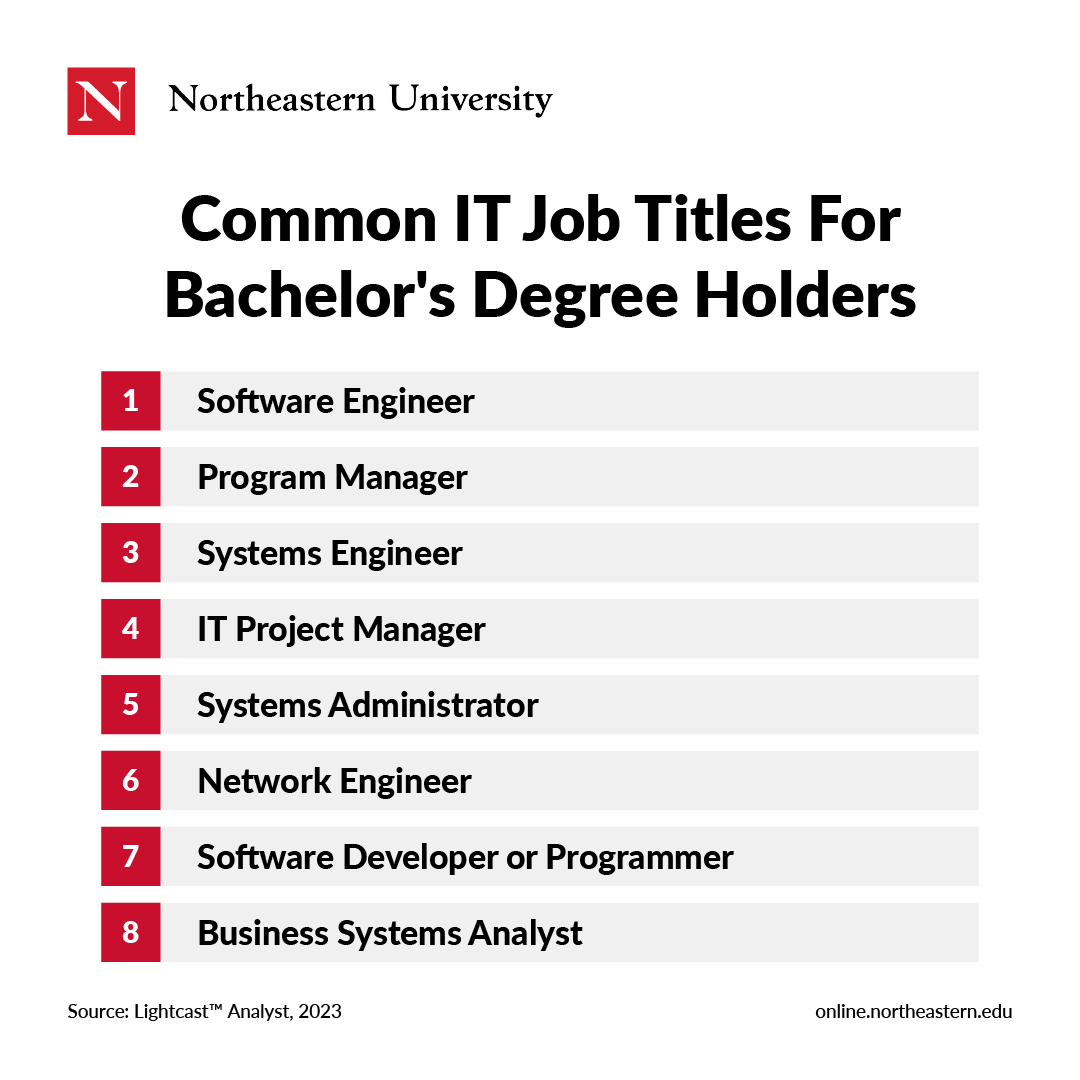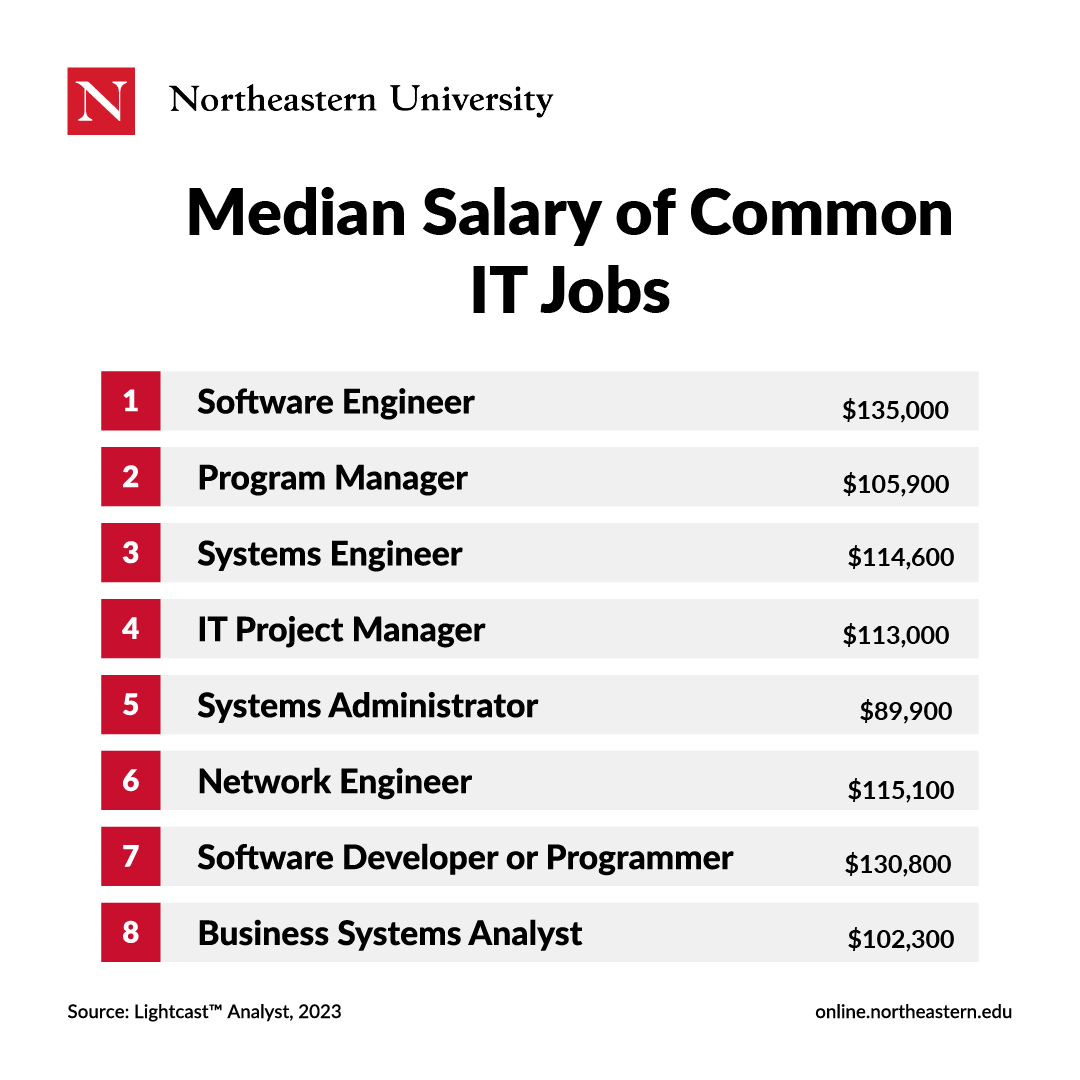Informational technology is critical to businesses across industries, leading to high demand for IT professionals who can demonstrate expertise in the field. It’s little wonder, then, that IT degree programs have multiplied as more and more people have decided to pursue work in this field.
But what kind of work, specifically, does earning an IT degree prepare you to do? What job titles and career paths will you be eligible for after earning a Bachelor of Science in Information Technology?
Below, we explore some of the most common jobs for IT professionals and the potential careers that earning a degree will prepare you for.
What Is Information Technology?
Contrary to popular belief, IT departments don’t only fix broken hardware or install new software; they are complex business units critical to many companies. IT departments can consist of many different team members who each perform a specific role.
For example, if a company collects and leverages large amounts of information, the collection, storage, and security of that data will require specific hardware and software. Therefore, supporting those data efforts will likely require at least one member of the IT department to be skilled in information security. Other IT personnel may support the various technologies that employees need to complete their daily activities.
Beyond these two examples, there are many others. IT departments are typically diverse groups consisting of individuals that perform three main functions:
- IT Governance: This function oversees the policies and processes that ensure an organization’s systems, architecture, and networks are efficient, effective, and aligned with the business’s needs. These policies often include rules and guidance around employee use of the company’s technology, IT security, and data assurance.
- IT Infrastructure: This work involves the set-up and maintenance of all hardware (e.g., company laptops, printers, routers, etc.), software tools, networks, and servers.
- IT Operations and Functionality: These professionals perform day-to-day maintenance operations, including tech support, developing, securing, and storing electronic data, overseeing technology applications, and assisting in software management throughout the entire company.
What Can You Do with an Information Technology Degree?
In most cases, you will need to earn a Bachelor of Science in Information Technology or a related degree in order to pursue an entry-level role in IT. Many businesses today will only consider hiring an applicant who has earned an undergraduate degree.
According to Lynda Hodgson, assistant teaching professor of the Information Technology program at Northeastern University, earning your degree is a critical step in gaining and demonstrating your proficiency in the IT field.
Once you’ve earned your degree, “you can work in just about any industry because there’s always an IT component,” she says.

Demand for an IT Degree
The demand for an information technology degree is skyrocketing in today’s digital age. According to our analysis of job postings data, IT management positions are expected to grow 17 percent between 2023 and 2032.

Unsurprisingly, this means businesses and organizations worldwide are increasingly relying on IT professionals to manage and optimize their digital infrastructure as technology becomes an integral part of our daily lives.
With an IT degree, aspiring professionals can learn the knowledge and technical skills to create, implement, and maintain complex computer systems, networks, and software applications. According to our analysis of job postings data, the most in-demand specialized skills employers look for include:
- Computer science
- Project management
- Agile methodology
- Programming languages
- Software development

Earning a degree in IT can help develop these valuable skills as well as develop common skills like communications, management, and leadership, which aren’t limited to any specific industry. This ensures the job market for IT professionals is incredibly robust and that an IT degree is an excellent long-term investment.
Common IT Careers
Depending on an organization’s size and industry, IT departments can require a variety of IT roles. However, here are some of the most common job titles for IT bachelor’s degree graduates according to our analysis of job postings data.

1. Software Enginee
Median Annual Salary: $135,000
Software engineers are skilled professionals who design, develop, and maintain computer software applications and systems. They use programming languages and various tools to create software that meets specific user or business requirements. Software engineers are also responsible for analyzing problems, finding efficient solutions, and ensuring the software functions reliably and securely. They often collaborate with cross-functional teams, including designers, testers, and project managers, to deliver high-quality software products.
2. Program Manager
Median Annual Salary: $105,900
A program manager is a strategic leader responsible for overseeing and coordinating a portfolio of related projects within an organization. They work to ensure individual projects align with stakeholder goals and objectives. Program managers also manage resources, budgets, and timelines to ensure successful project delivery. They serve as a bridge between senior management and project teams, facilitating communication and decision-making to achieve the desired outcomes of complex, interconnected projects.
3. Systems Engineer
Median Annual Salary: $114,600
Systems engineers specialize in designing and managing complex systems, which can include hardware, software, and their integration. They focus on ensuring all components of a system work together harmoniously to achieve a desired functionality. Systems engineers analyze requirements, create specifications, and develop system architectures to guide the development process. They also play a critical role in identifying potential issues, optimizing system performance, and ensuring the reliability and scalability of systems throughout their lifecycle.
4. IT Project Manager
Median Annual Salary: $113,000
IT project managers specialize in shepherding IT, hardware, or software projects from conception to completion. They spend much of their time managing budgets, schedules, and resources. Depending on the organization and the individual project, these individuals may perform technical work or may solely perform a project management role. IT project managers often hold an undergraduate degree in information technology and a master’s degree in project management.
5. Systems Administrator
Median Annual Salary: $89,900
System administrators are responsible for managing and maintaining an organization’s computer systems and networks, ensuring they operate smoothly and securely. They handle tasks such as system configuration, software installations, troubleshooting, and implementing security measures to safeguard against potential threats and downtime.
A database administrator (DBA) is a type of systems administrator. While systems administrators typically oversee and maintain an organization’s entire IT infrastructure, DBAs manage and maintain databases within that broader infrastructure. No matter what niche you choose, you can expect your work to revolve around data storage and processing, security and analysis, and more.
6. Network Engineer
Median Annual Salary: $115,100
A network engineer is a highly skilled IT professional responsible for designing, implementing, and maintaining computer networks within an organization. They work to ensure data can flow seamlessly and efficiently between devices, servers, and systems. Network engineers configure and manage networking equipment, such as routers, switches, and firewalls, to optimize performance, security, and reliability. They also troubleshoot network issues, monitor network traffic, and plan for network scalability to accommodate the organization’s growing needs.
7. Software Developer or Programmer
Median Annual Salary: $130,800
A software developer or programmer brings many IT projects to life. When these professionals create user-facing software, they’re known as frontend developers. When they create software that interacts with servers and networks, but not with individual users, these professionals are known as backend developers. People in these roles need thorough knowledge and experience with programming languages.
8. Business Systems Analyst
Median Annual Salary: $102,300
These individuals liaise between business and IT departments to solve business problems by leveraging technologies. They also help to ensure the successful Business systems analysts review data, set processes and procedures, and identify potential technological improvements.
Taking the First Step Toward Your IT Career
As you can see from the list above, earning your BS in Information Technology (or a related degree) provides several career opportunities and will prepare you for many positions within the IT field. By completing your bachelor’s degree, you can demonstrate proficiency in the required tools, techniques, and frameworks to future employers.
Earning your degree will also establish a solid base upon which you can build the rest of your career. For example, to pursue more advanced roles, you may need to earn an advanced degree, such as a Master of Science in Informatics or a Master of Science in Cybersecurity. Additionally, prospective employers might require a certification that aligns with a specific job title. In both of these cases, a relevant undergraduate degree is a prerequisite.
Are you interested in pursuing a career in IT? Learn more about the Bachelor of Science in Information Technology at Northeastern University to understand how earning your degree can empower you to reach your career goals.
